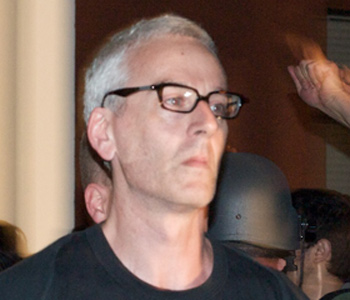W. Fitzhugh Brundage
Civilizing Torture: An American Tradition
Harvard University Press
416 pages, 6 1/8 x 9 1/4 inches
ISBN 978 0674737662
The “American tradition” in this book’s subtitle is not a particular method of tormenting the body. It refers instead to the debates that Americans have waged regarding torture. At the outset I decided that it was not feasible for me to produce an inventory of torture in the United States across four centuries. My interest instead lies with how Americans have debated, justified, and condemned torture. Like a minuet in which the dancers change fashions over time, yet the steps remain the same, American debates about torture have unfolded in predictable fashion. During these debates, Americans invariably have invoked the nation’s utopian ambitions to serve as the exemplar of modern democratic civilization. Torture, which Americans have associated with barbarism or tyranny, cannot easily be squared with the notion that the United States is a unique nation with uniquely humane laws and principles.
A common thread in American debates over torture is the presumption that Americans should exist in a state of national innocence, with torture held at arm’s length. Americans have been at best complacent and at worst willful in presuming that torture is something that other people do elsewhere. Any claims that torture is an exceptional aberration whenever Americans commit it are difficult to reconcile with the history recounted in my book. We cannot credibly claim that when other countries torture it reflects their basic character, but when we torture it violates ours. The history of torture in the United States, above all, reveals the toxic consequences when rhetoric and policies that dehumanize “the enemy within” or a foreign foe exploit popular anxiety about security. Appeals to security have been the ultimate excuse for and defense of torture. When the preservation of rights is believed to impede or diminish security, then rights have been jettisoned and even the prohibition of torture has been conditional.
My interest in these historical events is a product of our times. Prior to 2004 it is unlikely that I would have written a book about torture in the United States. But following the early revelations about the acts of torture and cruelty at Abu Ghraib and about “enhanced interrogation” techniques used by the CIA during the War on Terror my attention was drawn to the debate that ensued. In particular, I recall watching Senator John McCain as he denounced torture and insisted that torture was contrary to American principles. Americans, he vowed, do not torture. On this topic, he spoke with extraordinary gravitas, because he himself had been a victim of torture during the Vietnam War. I appreciated the sentiment that McCain expressed, even while I disagreed with its premise. After all, my first book had been on lynching in the American South between 1880 and 1930 so I knew for a fact that some Americans had committed torture and that they had done so unapologetically.
Prompted by curiosity about the Bush administration’s justifications for its policies, I did what historians do; I searched the library for scholarship to make sense of them. I had no intention of researching and writing on the topic at the time. I delved into the writings of human rights activists and legal specialists who traced the campaign against torture during the previous half century. But I searched in vain for a systematic account of torture in the United States. Civilizing Torture, eventually, took form as my effort to fill this void.
It is tempting to presume that sadists and zealots typically commit torture. Sometimes, they do. But American torturers have often insisted that their actions were altogether appropriate, morally justifiable, and in the best interest of their community.
In Chapter Two readers encounter earnest prison reformers during the first half of the nineteenth century who condoned methods of physical and mental punishment that they believed would rehabilitate incarcerated criminals. At some acclaimed prisons, for instance, a policy of perpetual isolation and silence prevailed. Prisoners lived for years with minimal contact or conversation with others. Advocates of this policy contended that it encouraged introspection that was the first step to rehabilitation. But other contemporaries countered that 24/7 isolation was a form of psychic torture that transformed inmates into mental wrecks. These critics advocated instead forms of harsh physical punishment, including whippings and simulated drownings (similar in effect to waterboarding), as apt methods for promoting the rehabilitation and obedience of prisoners.
While many of the forms of discipline were variations on time-honored techniques familiar in early modern Europe, the sites where nineteenth century prisoners experienced violence were wholly modern. Proponents vouched that any acute suffering that prisoners endured when subjected to simulated drowning or from weeks confined in complete darkness and silence were never by design. Prison reformers may have been sincere in their hope to redeem the nation’s criminals, but they designed and defended prison practices that perpetuated in a modern democratic society the state’s continued assault on the criminal’s body.
I intended the book to be a call for vigilance. America’s leaders, or those who act on our behalf, possess no innate moral or ethical lodestar that predisposes them to respect human dignity or rights. To the contrary, the American political system rests on the recognition that Americans, like all other human beings, have the capacity, even the inclination, to abuse power. The oft-repeated claim that the United States is a “nation of laws” is a concise expression of the Founders’ aspiration to channel and temper the exercise of power with rules, procedures, and constraints. Yet despite the Founders’ fear of an oppressive government, the nation’s democratic institutions and traditions have proved far more hospitable to torture than many Americans assume.
Bedrock elements of American democracy have arguably both fostered torture and hindered efforts to curtail it. Dispersed authority across multiple layers of local, state, and federal government along with the tradition of popular democracy and localism may have protected citizens from the tyranny of the national government. But that same decentralized power gave license to countless legal and self-declared agents of the state to wield the power of petty despots. Consequently, Americans should be vigilant against abuses of power in all severely hierarchical state institutions or wherever extreme inequality have been tolerated, even defended, in the name of the public good, tradition, or a consequence of human nature.




We don't put paywalls. We don't distract you with ads. We don't sell your data.
Please help to keep this running!